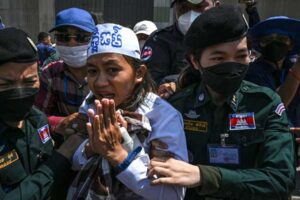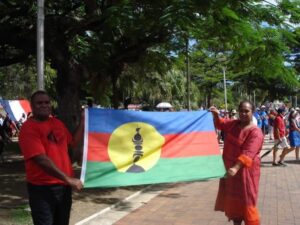
Asia-Pacific, Civil Society, Climate Action, Climate Change, Editors’ Choice, Environment, Featured, Headlines, Small Island Developing States, Sustainable Development Goals, TerraViva United Nations

The UN’s focus on green energy, plastic, biodiversity, and early warnings aims to safeguard the Maldives from climate change. Credit: UNDP Maldives / Ashwa Faheem
– The ocean is our lifeline, covering 70 percent of the earth’s surface, it is the source of half of the oxygen we breathe, and it absorbs 26 percent of the carbon dioxide we produce. It is home to millions of marine species, contains 97 percent of all of the water on our planet and offers humankind immense resources.
Maldives – 500,000 people living in ocean-side communities across an archipelago of 26 atolls and 1,192 islands – demonstrates both the challenges of living within an ocean world and its vast potential. Therefore, we must ensure that the ocean is not only our treasured history but part of our healthy and prosperous future as well.
The UN in Maldives together with Ocean Generation (an organization working to restore a healthy relationship between people and the ocean), is supporting the Maldives in meeting the increasing dangers of the climate crisis and preserving and protecting our threatened ocean.
At the recently concluded 4th Small Island Developing States (SIDS4) Conference in Antigua, Maldives President Mohamed Muizzu directly addressed these challenges, calling for international public and private sector finance to invest in Maldives – to provide urgently needed climate financing for new green energy sources and to fund climate protection for communities and islands threatened by rising sea levels.
Recognizing the precarious state of our oceans due to human consumption patterns and global heating, the President has recently ordered a pause to coastal development activities over concerns of high-water temperatures and coral bleaching in nearby waters.
Heeding the President’s call, the UN and Ocean Generation are looking forward to working with Maldives towards solutions for the challenges faced by one of the most climate-vulnerable states in the world.
Here are four key areas with the potential to make the biggest difference.
1) Green energy
A critical issue for Maldives is to reduce the use of expensive diesel fuel for energy production and transport between the many and distant atolls and island communities. Less diesel fuel use is a win-win: fewer carbon emissions and less foreign exchange spent on costly imported fuel.
International investment is urgently needed to scale-up commercial, private-sector supported solar and other renewable energy sources for the capital city Malé and other urban areas, for smaller island communities, and for resorts.
Meeting the Government’s goal of 33 per cent green energy supply by 2028 is a key priority where UN and World Bank initiatives can contribute.
2) Reducing plastic pollution
Safely disposing of waste and reducing the amount of waste that is generated are crucial goals for improving the lives of coastal communities. Reducing the import of single use, throwaway plastics into Maldives that ultimately end in our ocean and wash up on the shores of Maldives atolls, will be essential.
Global plastic production is currently around 420 million metric tonnes per year. Half of this is destined for single-use. We cannot rely on recycling to address our plastic waste problem. Only 13 percent of global plastic is recycled and of that 13 percent, only 1 percent is re-used through the system again meaning that even the plastic that does get recycled will eventually end up in landfill, being burned or in the environment.
Maldives Ministry of Environment, Climate Change and Technology’s efforts to increase fees on plastic bags is essential to the national goal of phasing out plastic usage. Working with the Government, the UN and Ocean Generation strive to raise awareness among stakeholders of the cost of inaction and the shift towards environmentally-friendly alternatives to single-use plastics.

The rich biodiversity of the Maldives is vital for the resilience of its island communities, supporting thriving fisheries, diverse vegetation, and various economic opportunities. Credit: UNDP Maldives / Ashwa Faheem
3) Biodiversity conservation
The broad biodiversity of Maldives coastal and marine life is the key to resilience of the interconnected communities of the islands, through fisheries and vegetation and economic livelihoods. Maldives can act as a global laboratory both for oceanic health and for the immediate and dynamic effects of climate change. Ongoing UN initiatives focused on conservation and sustainably managing coral reefs in fishing communities are already laying the ground for local lessons to shape national policy change.
4) Fighting climate change
The ocean is our biggest ally when it comes to climate change, especially with regards to absorbing heat. Average global temperatures today sit at 15 degrees C, (59 F) and without the ocean absorbing heat, that average is estimated to be 50 degrees C (122 F). Maldives has already demonstrated its commitment to climate resilience, by becoming the first country in Asia and the first Small Island Developing State to embrace the UN Secretary-General’s Early Warnings for All (EW4All) initiative.
Globally, it is the first country to endorse a national EW4All road map, at the presidential level, to ensure multi-hazard early warnings for all by 2027. Continuing to conserve, protect and restore marine resources, as a clear nature-based solution to climate change, is of utmost priority.
Maldives’ climate initiatives offer valuable lessons for all island nations, and their successful implementation could serve as a model for global change. By scaling up efforts to reduce fossil fuel dependence and combat throwaway consumerism, we can protect our oceans and planet, creating a sustainable future for all.
This article was adapted from an Op-Ed written by the UN Resident Coordinator in the Maldives Bradley Busetto and the founder of Ocean Generation Jo Ruxton, MBE. The links follow: maldives.un.org oceangeneration.org.
Source: UN Development Coordination Office (UNDCO).
IPS UN Bureau

















